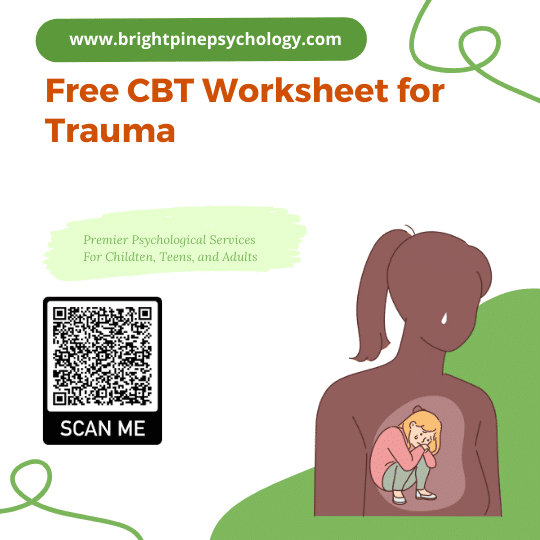Table of Contents
Free CBT Worksheet for Trauma
Trauma can leave lasting emotional imprints—such as anxiety, intrusive thoughts, shame, and a constant sense of unease. Whether you’ve experienced a single traumatic event or prolonged exposure to complex trauma, Cognitive Behavioral Therapy (CBT) provides a structured, evidence-based path to healing.
One of the most effective and accessible tools in trauma-focused CBT is the CBT worksheet. These guided forms are designed to help you process your experiences, identify trauma-related thought patterns, and develop healthier coping strategies. Whether you’re working with a therapist or starting your own recovery journey, a CBT worksheet for trauma can provide clarity, structure, and support along the way.
What Is a CBT Worksheet for Trauma?
A CBT worksheet for trauma is a structured tool that helps individuals:
- Identify trauma-related thoughts, beliefs, and triggers
- Understand how these thoughts impact mood and behavior
- Reframe unhelpful beliefs such as “I’m weak,” “It was my fault,” or “I’ll never be safe”
- Practice grounding or coping skills when distress arises
- Track emotional responses to reminders of trauma
These worksheets often support Trauma-Focused CBT (TF-CBT) or Cognitive Processing Therapy (CPT)—two well-established trauma treatments within the CBT framework.
Who Uses CBT Worksheets for Trauma?
These worksheets are used by:
- Individuals who have experienced traumatic events, including abuse, accidents, loss, or violence
- People with Post-Traumatic Stress Disorder (PTSD) or Complex PTSD
- Survivors of childhood trauma or relationship trauma
- Clients in therapy, guided by a trauma-informed CBT clinician
- Individuals pursuing self-guided recovery with structured tools
They are appropriate for adults, teens, and even children (with age-appropriate adaptations).
What Is the Purpose of the Worksheet?
The worksheet serves several healing purposes:
- Increases awareness of how trauma impacts current thoughts and emotions
- Helps identify cognitive distortions linked to guilt, shame, or fear
- Encourages emotional processing in a safe, structured way
- Supports the development of healthier beliefs about the self and the world
- Reinforces coping tools such as grounding, self-soothing, and behavioral activation
In therapy, worksheets provide continuity between sessions and give clients a way to practice skills independently.
Why Are They Effective?
CBT is a gold-standard approach for treating trauma and PTSD. Worksheets enhance this process by:
- Breaking down complex emotional experiences into manageable parts
- Helping individuals identify stuck points—thoughts that are keeping them from healing
- Encouraging self-reflection and reappraisal
- Providing a tangible way to track progress over time
When used with a therapist or in a structured program, CBT worksheets help transform the trauma narrative from one of helplessness to one of growth and agency.
Common Questions About CBT for Trauma (Q&A)
How is CBT different from just talking about trauma?
CBT is not just storytelling—it’s structured and focused on how trauma has shaped your thoughts, beliefs, and behaviors. It helps you reprocess and shift those patterns in a safe and practical way.
Will I have to relive my trauma to use a worksheet?
No. While you may reflect on trauma-related thoughts or triggers, CBT worksheets are designed to help you gain control, not become overwhelmed. Therapists guide you to work at a pace that feels safe.
What if I blame myself for what happened?
That’s common—and CBT addresses it directly. Worksheets help you examine those beliefs, look at the evidence, and begin to shift toward more compassionate and accurate understandings of the trauma.
Can worksheets really help with flashbacks or nightmares?
They can help you identify patterns and triggers, track your responses, and apply skills to manage them. For flashbacks, CBT also incorporates grounding techniques that are often built into the worksheet process.
What is a “stuck point” in trauma recovery?
A stuck point is a thought that keeps you from healing—for example, “I should’ve done something,” or “I can’t trust anyone.” CBT worksheets help you identify and challenge these thoughts so you can move forward.
Can I use CBT worksheets for trauma without a therapist?
Yes—many people do. However, if you’re feeling overwhelmed or uncertain, working with a trauma-informed CBT therapist can provide added safety and support.
How long does CBT for trauma usually take?
Some people notice changes in 8–12 sessions, while others need longer, especially if they’ve experienced complex or repeated trauma. CBT is adaptable—it meets you where you are.
Is CBT just about changing thoughts?
Not at all. It’s also about:
- Processing emotions in a safe way
- Reconnecting with your body
- Taking meaningful actions that rebuild your life
Want to Get Started?
Download a Free Trauma-Focused CBT Worksheet.
Use it to process difficult moments, challenge negative beliefs, or practice coping skills when triggered. You can bring it to therapy or work through it on your own at your own pace.
Final Thoughts
Trauma may shape your story, but it doesn’t have to define your future. CBT worksheets are a powerful way to begin gently challenging the fears and beliefs trauma may have left behind—and to take meaningful steps toward safety, choice, and healing. You don’t need to take giant leaps. One worksheet, one thought, one new belief at a time—you’re already moving forward.
At Bright Pine Behavioral Health, we understand how deeply trauma can impact your mental health, and how important personalized support is on the path to recovery. Our licensed clinicians offer trauma-informed therapy, consultation calls, and comprehensive psychological assessments to help you better understand your needs and find a treatment path that feels right.
Whether you’re seeking help with trauma, exploring a possible diagnosis (such as PTSD, anxiety, or autism), or simply don’t know where to start, our team is here to guide you. You can begin by submitting your information through our secure form or scheduling a consultation call. During this call, one of our experienced clinicians will listen to your concerns, walk you through your options, and help determine your next steps.
Let Bright Pine Behavioral Health be your trusted partner as you move toward clarity, support, and lasting healing.



